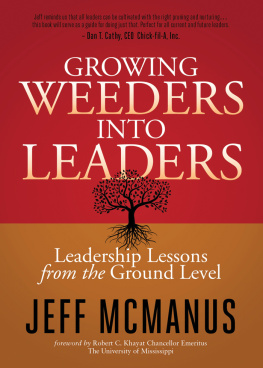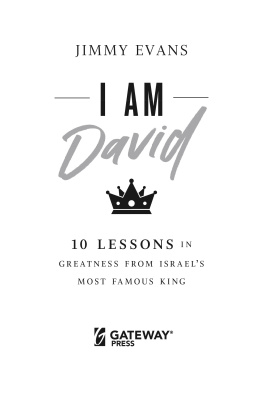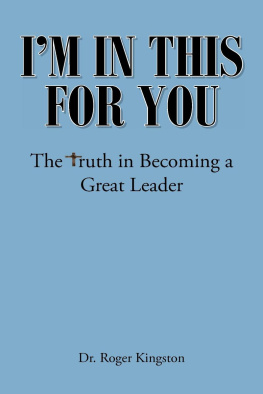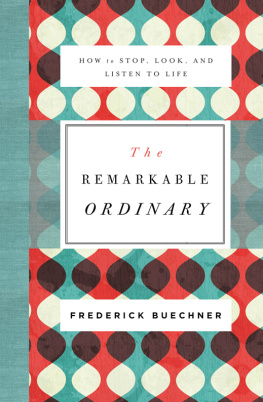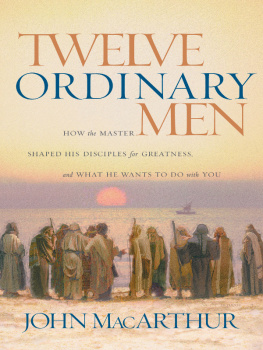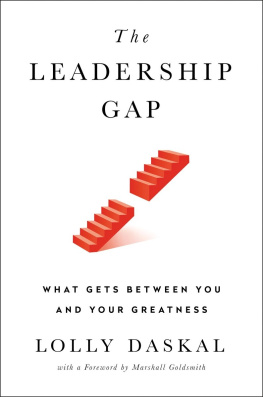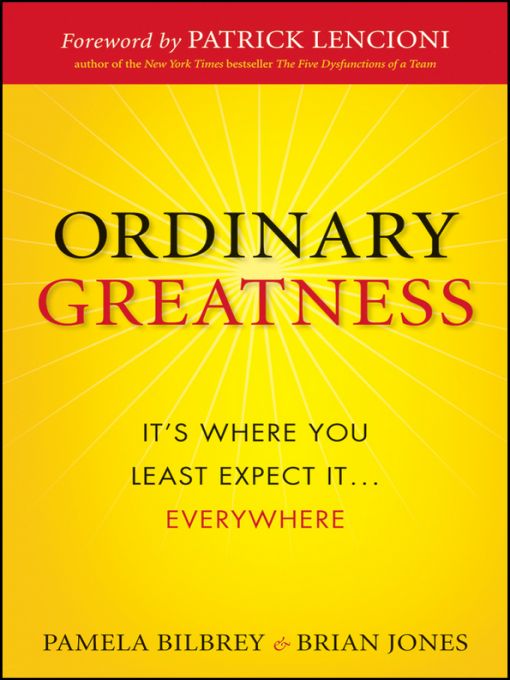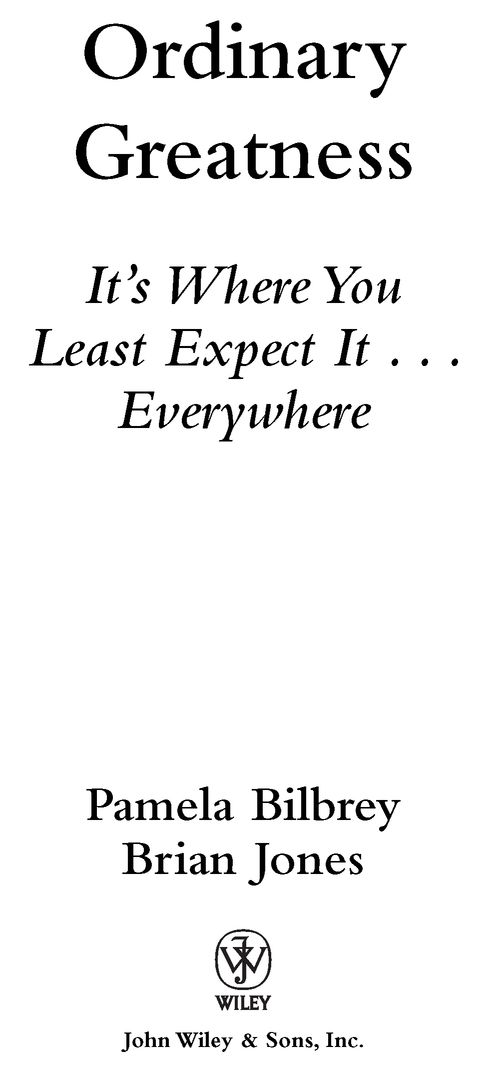Table of Contents
Additional praises forOrdinary Greatness: Its Where You Least Expect It... Everywhere
What are you doingor not doingto find ordinary greatness? Bilbrey and Jones sharpen our focus and change our perspective with pointers that harness what can be celebrated daily. Youll find it in places you never imagined and, when you do, higher performance and increased productivity are not far away. Buy two copies of this bookone for you and one for your boss.
Barbara Pagano, Ed.S., Founding Partner, yourSABBATICAL, Author ofThe Transparency Edge: How Credibility Can Make or Break You In Business
In the most reflective moments of our life we wonder about paths not taken and whether there still might be time to explore new territory. Ordinary Greatness is one of those rare books that allow you to think through what might yet be, both personally and in the wider spheres of existence in our families, and even in our organizations. What If ... ? Why not ... ? Could I... ? and once those questions begin, the tremendous voyages of our lives can begin. Greatness is there for the taking so be careful-you may not want to risk moving out of your comfort zone.
V. Clayton Sherman, Ed.D., Chairman,Gold Standard Management Institute,Author ofCreating the New American Hospital
What the authors offer us is a well thought out and tested strategy for moving organizations towards their full potential.The thesis is clearly presented that as we acknowledge the greatness that can be found every day right in front of us then we can create even more of what we most need in this challenging moment. What we most need is the confidence and the certainty that we can succeed and this book shows us how available that is to us if we can just take a moment to stop our rushing towards an immediate solution and fully appreciate the potential that has always been in us.
Ken Murrell, D.B.A., Professor, University of West Florida, Co-Author ofEmpowering EmployeesandEmpowering Organizations
Ordinary Greatness is an inspirational and practical book that guided each person to discover his/ her unique gifts and the courage to live their greatness, demonstrating the highest forms of personal accountability.
Mark Samuel, Co-Author ofThe Power of Personal Accountability,Author ofCreating the Accountable Organization
A great guidebook loaded with lots of practical advice and strategies to help leaders actualize their potential. In a very real way, this book also shows leaders how to help others be and do more than they thought possible. And unlike many books, the techniques are easy to useall it takes is opening your eyes to the greatness that exists right before you.
Robert Kriegel, Ph.D., Consultant and Author,Sacred Cows Make the Best BurgersandIf It AintBroke... BREAK IT!
Thank you, Pam & Brian, for reminding us about the good/bad news in discovering talent. The good news is that greatness exists all around usacres of diamonds right in our own back yard. The bad news is that we can easily miss it, as it often comes disguised in ordinary packages.
Jim Hunter, internationally best-selling author ofThe Servant
To my family:Your love, support, and
encouragement are never ending.
PB
To Melanie and my boys:Your greatness
is anything but ordinary.
BJ
Foreword
Antiques Roadshow is a television program that was particularly popular a number of years ago, and which I believe is still running. It involves people bringing their various antiques to a traveling group of experts who tell them how much their item is worth. One of the reasons why so many people watched the show was to witness that moment when one of the experts told an unsuspecting antique owner that the lamp or end table or ceramic dog that had been taking up space in their garage for the past twenty years was actually worth a small fortune.
Beyond the novelty of realizing a windfall without having to do any real work, there is much more at work here. There is just something amazing about looking at an item that you once viewed with ambivalence and seeing it anew as an object of great worth. When that item is a person, the excitement is particularly powerful.
To understand this phenomenon, consider another popular television showAmerican Idol. There are hundreds and hundreds, probably thousands, of established singers in the world, all of whom are worthy of our time and money if wed like to hear talented voices. But we just wouldnt get millions of busy people to stop what they were doing twice a week to listen to them simply by putting them on television. But create an environment where we get to discover hidden talent among people who we wouldnt normally notice if they bumped into us on the street, and were suddenly fascinated.
Well, within the organizations where we work, there are lamps, end tables, ceramic dogs, and pop stars just waiting to be dusted off and celebrated every day, and there is something powerful and exciting about being the one to take them out of the garage and dust them off or let them sing.
In Ordinary Greatness, Pam Bilbrey and Brian Jones explore this concept and provide a comprehensive and practical set of tools for excavating the hidden value and talent buried deep within our companies, hospitals, churches, and schools. They base their advice on their own substantial experience working with real leaders in real organizations where theyve helped bring about excellence where others may have seen mediocrity.
But Pam and Brian do something beyond helping organizations achieve more than they thought possible, though that alone is a great reason to buy and use this book. They also provide a blueprint for us to go about changing the lives of people who work for us by helping them realize their potential and become the people they are meant to be. That is certainly one of the most worthwhile endeavors that any executive or manager can undertake. It would also make for some great reality TV.
Patrick Lencioni
Author of The Five Dysfunctions of a Team: A Leadership Fable
Preface
One of the worlds premier violinists, Joshua Bell, had performed in such illustrious settings as Londons Royal Albert Hall, the Verbier Festival in Switzerland, and Carnegie Hall. He had toured with such acclaimed groups as the Orchestre National de France, the Salzburg Mozarteum Orchestra, and the Tonhalle-Orchester. But he had never, ever done a gig at the LEnfant Plaza Metro station in Washington, D.C.
As it turned out, his performance there on Friday, January 23, 2007 went mostly unnoticed. Yes, amazingly unnoticed. Three days prior, people had paid $100 for less than very good seats to hear him play in Bostons magnificent Symphony Hall. Several weeks later, he would accept the Avery Fisher prize as the best classical musician in America.
But that chilly day at the LEnfant Plaza Metro station, he was incognito, unadvertised, and unknown. He appeared to be just one more street person hoping to get enough money dropped in the open violin case in front of him to pay for his next meal. What was Joshua Bell doing there? He was taking part in a fascinating project set up by


